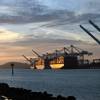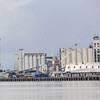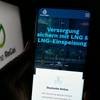In the first six months of 2001, throughput in the port of Rotterdam increased to 161.8 million tons, 2.3% more than in the first half of 2000. The transshipment of coal (+26%), petrochemical products and petcokes(+%), crude oil (+7.5%) and agribulk (+16%) in particular contributed to the good result. Other liquid bulk (chemicals, oil and fats, -2%), other dry bulk (including sand, phosphates, minerals, -%), ores and scrap (-10.2%) and the three general cargo groups (roll on/roll off, containers and other general cargo) showed a decrease. Total incoming trade increased by 5%, while outgoing trade was down 6%. During the first six months, growth gradually slackened off again. Considering this leveling off in economic growth and the very good second half of 2000, an annual record is unlikely.
Coal throughput shot up by 26% to nearly 14 million tons in the first six months. Taking the year as a whole, it is possible that the historical "coal record" of 23.7 million tons in 1991 will be bettered. After 1991, there was a fall due to the loss of German exports to Southern Europe and the United Kingdom. After first losing export trade as the price was too high, the domestic market also started to crumble. Imports increased and coal throughput in Rotterdam also started to grow again from 1997 onwards. In 2000, 60% of the throughput was destined for Germany. Rotterdam's market share in total German coal imports (from Eastern Europe and overseas) is 40%. The German government has decided to gradually close down the coal mines. If coal's share in energy provision remains stable, more imports are therefore needed, which makes the prospects for coal throughput favorable. At the beginning of 2001, ThyssenKrupp decided to make substantial investments in the throughput of coke coal at the EECV terminal. At the end of 2000, EBS decided to make coal throughput a core activity. The terminal in the Laurenshaven is being equipped to unload larger ships. A fourth berth has been built for the EMO.
In the throughput of ores and scrap, last year's record level was not retained. Thanks to reduced production in the German car industry during the first few months of the year, ore imports decreased by 10% to over 20 million tons. Now that car production is starting to pick up again, ore throughput will probably not decrease further in the second half of the year. While the handling of agribulk was down last year, things have now improved again. In the first six months, 6 million tons were transshipped. Exports remained stable at 1.2 million tons, imports increased by twenty percent to 4.8 million tons. The growth is due mainly to the increase in imports of products for human consumption, such as oilseed and grains. Approximately 700,000 tons less (-..% ) of other dry bulk were transshipped. The most important reason is the cessation of artificial fertilizer production by Hydro Agri and Kemira and the transshipment of artificial fertilizer by Hanno. In the first six months of 2000, they together accounted for 500,000 tons. The throughput of sand, gravel and other raw minerals also decreased.
In the first six months of 2000, throughput of crude oil was exceptionally low. Afterwards, stocks were replenished so that throughput increased by 8% to 49 million tons in the same period of 2001. In the second half of the year, diminished growth is expected. In the sector petroleum products (petrol, diesel, kerosene etc.) there are many regional differences in balance when it comes to quality and quantity. As one of the largest refinery centers in the world, Rotterdam is important in bringing the balance into equilibrium. This occurs both in Europe and inter-continentally, particularly with the USA. In the last six months, the balance traffic has been very intensive and the throughput of oil products has increased strongly, by 16% to 14 million tons.
Since the beginning of the eighties, other liquid bulk has been on the increase. In 2000, growth was particularly strong as deferred investments in Asia (result of crisis) led to a shortage in production capacity for bulk chemicals. Meanwhile, this has been made up for and less supplementation from Rotterdam is needed. The outgoing trade in liquid bulk therefore decreased in the first half by more than 10%. The market is now on the increase again, in line with the normal pattern. The decline in outgoing trade was compensated for partially by higher imports. Methanol is a growth product here, for which Rotterdam is developing into the European center. Last year a flow from Chile developed, followed this year by incoming trade from a new plant in Equatorial Guinea. Due to the closure of a plant on Teesside (UK), Rotterdam has also become a pivot for methanol for this area.
The handling of container cargo was down in comparison with the first six months of 2000, from 33 to 31 million tons. In TEUs (units of 20 foot), the decrease amounted to 3.2% or 100,000 TEU to 3.1 million TEU. The sharp increase in empty containers (+19.3%) is striking. The main reason for the fall in throughput is the shift of much feeder cargo to other ports. In the first half of 2000, most of this was handled in Rotterdam. Taken over 2001 as a whole, the negative 'feeder effect' is weakening when expressed in figures. This does not mean, however, that the picture will become over-favorable. Maersk Delta is expanding its terminal capacity as quickly as possible, but the question is whether this will be enough to 'make up' in the short term. This is particularly so as the economic growth is slackening and cargo is being lost because people believe that cargo controls in Rotterdam are strict, leading to delays. There is only a small chance of this but shipping companies and shippers tend, nevertheless, to avoid the risk of delay. The customs, ECT and shipping companies/shipbrokers have meanwhile developed a procedure for carrying out checks within a time frame acceptable to the market. In addition to customs, various other control services operate in the port. Their co-ordination is open to improvement and their procedures should take more account of the wishes of port clients. Rotterdam Municipal Port Management is asking the four ministries involved pay attention to the problem.
Since 1975, roll on/roll off traffic has more than trebled. The picture of a structural growth sector is confirmed by investments from all companies in the RoRo sector: DFDS Tor Line, Stena Line, P&O NSF, Cobelfret, SCA Interforest and RCT. The decline in the first half of the year, by over 7% to 4.6 million tons, is due to the outbreak of Foot and Mouth. This is because about 80% of RoRo cargo to and from Great Britain involves foodstuffs.
Following a recovery at the end of last year, other bulk has fallen sharply again: - 9.6% or 400,000 tons. Outgoing trade suffered most, with a decline of 14%. The most important cause is the decrease in the export of iron, steel and non-ferrous metals to the USA. On the other hand, outgoing trade in fruit is doing well again. In 2000, throughput fell by 15% because South American exporters preferred the dollar market to the (low) Euro market. This currency disadvantage still exists, but prices are extremely high due to a shortage of citrus in Europe. The result is more incoming trade (up to 20%) in South American fruit. The price of fruit juices is also showing an upward trend, bringing throughput back onto a growth path. This movement is accompanied by investments from Hiwa, EJT and Wild.
Featured videos

Tracking Foreign Vessels Working in the U.S. Jones Act Market

Inmarsat Enhances Service to Drive Digitalization

Inside the Electrified Truckable Tug
Subscribe for
Maritime Reporter E-News
Maritime Reporter E-News is the maritime industry's largest circulation and most authoritative ENews Service, delivered to your Email five times per week








